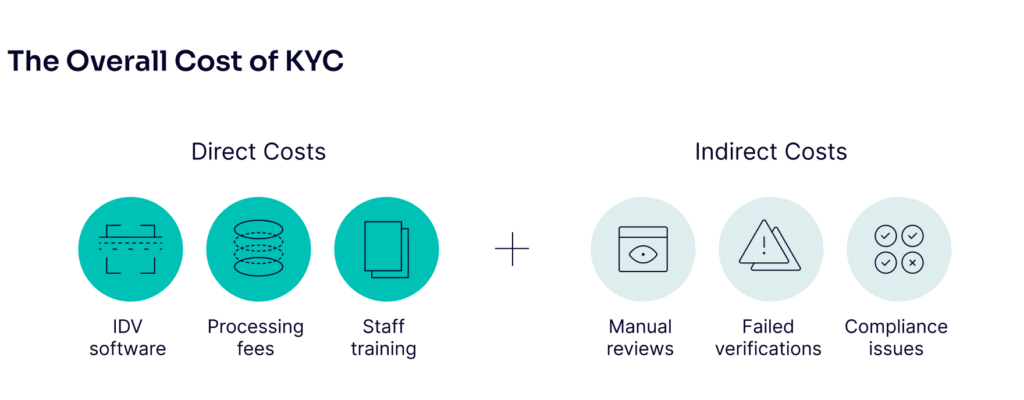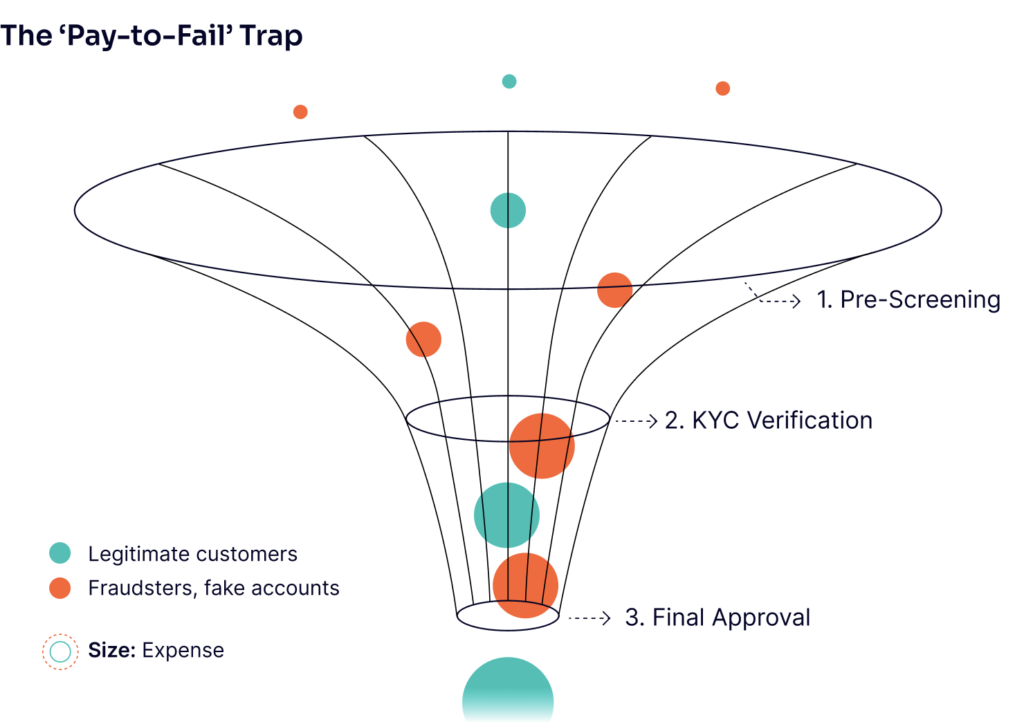Businesses today spend millions on Know Your Customer (KYC) processes only to watch a significant portion of customers fail due to fraud. KYC is an expensive cycle with a varied price tag that wastes valuable resources and complicates the onboarding experience for genuine customers.
Relying on KYC as a catch-all safety net has created a flawed system where companies end up paying for fraudsters to fail, and every failed verification translates to wasted time, effort and money. By filtering out fraudsters earlier in the process, businesses can cut KYC expenses, streamline operations and ensure that only legitimate customers reach the final verification stage.
Make more informed business decisions in real time and cut costs.
See solution
The Hidden Costs of Manual and Automated KYC
KYC verification, whether manual or automated, come with a significant price tag. Direct costs, such as processing fees for identity verification, specialized software purchases and staff training, quickly add up. While automation may speed up the process, it still requires investment in technology and ongoing maintenance.
Indirect costs are often overlooked and can be just as burdensome. Time and resources spent failing KYC, conducting manual reviews and navigating compliance issues accumulate rapidly, augmenting the overall cost of AML compliance and impacting the company’s profitability. These compounded expenses can be mitigated by implementing smarter, proactive fraud detection strategies earlier in the onboarding process.

The ‘Pay-to-Fail’ Trap
Many businesses find themselves trapped in a reactive KYC model, where fraudsters are only identified once they’ve progressed through several costly steps. Each failed verification represents a waste of funds that could have been avoided with better pre-screening. Companies caught in this ‘pay-to-fail’ paradigm spend resources verifying individuals who will never pass, driving up operational costs without adding revenue. Beyond financial waste, this also introduces unnecessary friction into the onboarding process, frustrating genuine customers and increasing compliance risks.

Sorting the Wheat from the Chaff
To escape the costly cycle of KYC failures, businesses must adopt a proactive pre-KYC filtering strategy. Using device intelligence, digital footprint analysis and behavioral data analysis, companies can detect high-risk applicants early – well before resource-intensive KYC checks are triggered. This approach significantly reduces the number of fraudulent applications entering the verification stage, cutting costs and optimizing operational efficiency.
Together, these technologies work seamlessly to allow legitimate customers to proceed while flagging potential risks for further scrutiny. Device intelligence identifies suspicious patterns in hardware, software and network configurations. Digital footprint analysis builds and analyzes a user’s online presence and activities to uncover users with similar characteristics to fraudsters. Behavioral data provides deep insights into user interactions, revealing subtle warning signs of fraud before it escalates.
Make Your KYC Work for You, Not Against You
Adopting a pre-KYC filtering strategy gives businesses two distinct advantages: lowering KYC costs and delivering a smoother onboarding experience for genuine customers. By focusing resources on high-potential applicants, companies can reduce the number of costly KYC checks, resulting in substantial savings, more efficient operations and minimizes compliance risks.
Streamlining the onboarding process also reduces friction, ensuring that only high-quality applicants advance, which boosts customer satisfaction and retention. Investing in this proactive approach not only enhances operational efficiency but also strengthens a company’s brand reputation by focusing on customers who will succeed.
How SEON Can Help
SEON’s digital footprint solution and device intelligence solution are essential tools for pre-screening clients before initiating KYC checks. These solutions enable businesses to detect fraud early by leveraging real-time data and behavioral insights, filtering out high-risk applicants and minimizing KYC expenses without compromising the customer experience.
Protect your business and stay ahead of emerging threats
Combat fraud with device intelligence
Frequently Asked Questions
Reducing KYC costs starts with early fraud filtering. Pre-KYC screening prevents high-risk individuals from reaching costly verification stages, while tools like device intelligence and behavioral data detect fraud early. Automating parts of the process lowers labor costs, reduces errors, and accelerates verifications, streamlining workflows and focusing on genuine customers.
KYC and compliance in general require companies to hire specialists, deploy software, and dedicate more resources to managing identity verification. To make matters worse, the KYC process can also add friction that drives potential customers away by creating churn.
While KYC software is a great first step, you can also deploy pre-KYC checks that help immediately filter out junk users – saving you on official, costly KYC checks. For instance, by looking at alternative digital data, you can start spotting bad users as soon as they begin the onboarding process.
The cost of KYC can vary significantly depending on several factors, including the method used (manual vs. automated), the technology adopted, the volume of verifications processed and the compliance requirements in different regions. Direct costs typically include identity verification software, processing fees and staff training, while Indirect costs, such as time spent on manual reviews, failed verifications and compliance management, can also add up quickly, impacting overall profitability.









